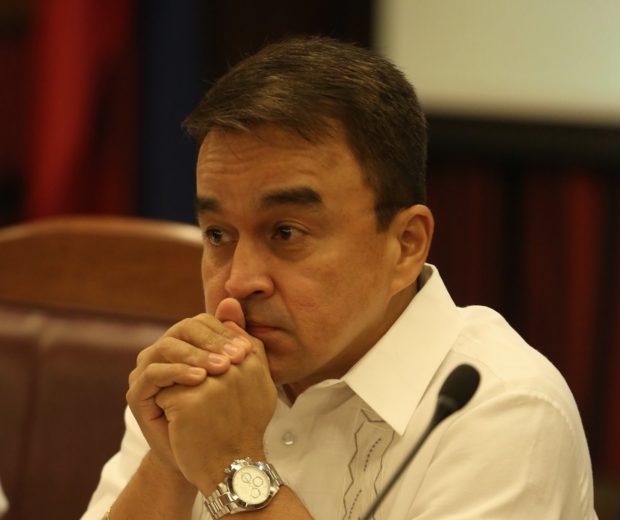Illegal drugs paid as reward to PDEA informants? House panel wants urgent probe

(FILE) Surigao del Norte Rep. Robert Ace Barbers. INQUIRER FILE PHOTO / NINO JESUS ORBETA
MANILA, Philippines — The House of Representatives Committee on dangerous drugs has called for a motu proprio investigation into the Philippine Drug Enforcement Agency (PDEA) policy of paying 30% of confiscated drugs to law enforcement assets or informants for successful seizures.
During the hearing on Tuesday, committee chairperson and Surigao del Norte 2nd District Rep. Robert Barbers asked for any motion to look into this practice of PDEA, after Director General Virgilio Moro Lazo himself admitted that some assets offered him “jobs” where the officials would not do anything.
In response, Batangas 2nd District Rep. Gerville Luistro made the motion.
Before the motion, Lazo said that since he assumed the PDEA leadership last November, agents offered to give them “jobs” where the system is that 30 percent of the actual seizures would be considered a payment.
“There were agents offering to give us — ang term sir nila trabaho eh, bibigyan kami ng trabaho (the term was they would give us a job). So I personally sat down with some of them, eh ang sistema (the system) sir, I do not have to spend anything, they will do all the work, but they are asking 30 percent of the actual seizures as their payment,” Lazo told the committee.
Article continues after this advertisementAccording to the PDEA chief, he told agents that the only reward PDEA would give while under his helm would be monetary value, not the illegal drugs seized.
Article continues after this advertisement“So I outrightly told them that as far as my administration is concerned, we are only to give them the monetary value through our rewards system. That is my experience, sir,” Lazo explained.
“Until this moment, I tell our agents in PDEA if there are offers for operations to be launched or initiated, we will only give them the monetary value of their actions. I do not allow the seizure or the payment of drugs as their payment for their efforts,” he added.
Barbers meanwhile said that such a statement reveals why illegal drugs make it back to the street level — because assets may be returning it to users and drug lords.
“‘Yon ang ano, I think that’s a revealing statement, DG Lazo. The assets who give information to PDEA and PNP are rewarded through your rewards system, based on the number of kilos that are apprehended, tama po ba ‘yon?” Barbers asked, to which Lazo agreed.
“So ‘yan, that is a very serious drug problem. If you have one kilo apprehended, 30 percent goes back to the street, ‘yong asset kasi meron siyang link with the users and the drug lords eh. So kaya pala, paulit-ulit, balik-balik ‘yong droga sa kalsada or ‘yong illegal substance sa kalsada,” he added.
Batanes Rep. Ciriaco Gato Jr. asked Lazo what happened to the asset, who proposed getting 30 percent of the seizures, to which the PDEA chief said the asset was informed that such a system would not be adopted.
“I am just wondering what happened to the asset who proposed the commission of the 30 percent, is there a sanction and how do you screen your assets?” Gato asked.
“The asset that initially offered to us that he will be rewarded with 30 percent, after having been informed that we can only go for a monetary reward, until this time continues to work with us […] Yes, we are still using him, but he knows already that he will be only rewarded with the monetary reward that PDEA can give,” he added.
Gato, however, warned that this practice is dangerous because the asset might think of other ways to get a reward — which may mean going back to the drug trade.
For some time before PDEA’s admission, speculation persisted that multiple agents were complicit in the practice of recycling pharmaceuticals obtained during operations.
In 2019, in the midst of former president Rodrigo Duterte’s war against illegal drugs, ex-PDEA chief Aaron Aquino admitted that the practice of recycling drugs is still rampant.
READ: PDEA chief admits ‘recycling’ of drugs ‘still rampant’
Just this December 2022, the Philippine National Police (PNP) said it would investigate allegations of an organized group within their ranks and the PDEA involved in drug recycling.
Because of the rumors, Interior Secretary Benjamin Abalos Jr., who oversees the functions of the PNP, asked full colonels and generals to resign amid possible drug links.
RELATED STORIES:
PDEA agents’ arrest prompts probe of drug ‘recycling’
Abalos seeks courtesy resignation of all PNP colonels, generals amid possible drug links